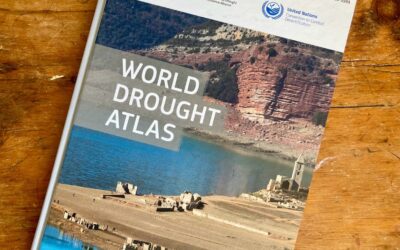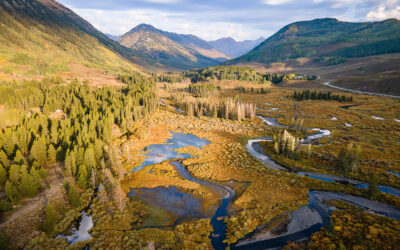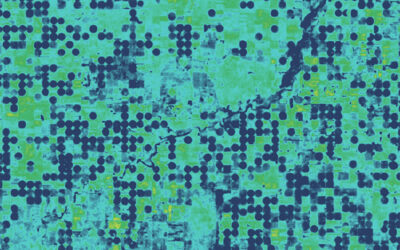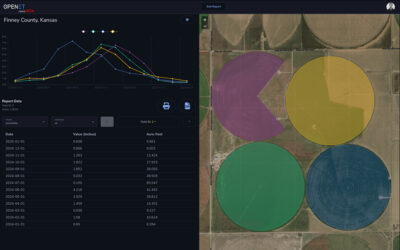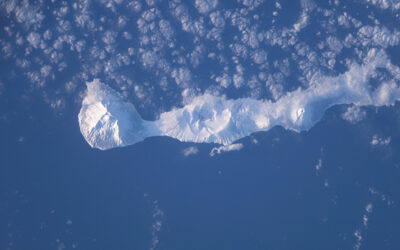A new study examined decades of atmospheric river storms across the West Coast to pinpoint the conditions that lead to catastrophic flooding. The research, published June 4 in the Journal of Hydrometeorology, analyzed more than 43,000 atmospheric river storms across 122 watersheds on the West Coast between 1980 and 2023.
New Study Offers Detailed Look at Winter Flooding in California’s Central Valley
The research used satellite imagery to identify where winter flooding occurs, which can improve flood risk awareness and inform how to best redirect floodwaters to replenish groundwater supplies.
Native Waters on Arid Lands project featured in World Drought Atlas
DRI’s Native Waters on Arid Lands project was recently featured in the 2024 World Drought Atlas, a 175-page hardcover reference book for decision-makers detailing drought impacts and adaptation solutions from around the world.
Spring Runoff is Older Than You Think
DRI’s Rosemary Carroll, Research Professor of Hydrology, co-authored a new study that found spring runoff in mountains across the Western U.S. is much older than previously known. Using advanced dating techniques, the research discovered that melting mountain snowpacks first replenish groundwater reserves before filling springs several years later. This means that the water relied on by communities across the West takes over five years from snowflake to streamflow. The research has implications for water management and our understanding of the changing dynamics of water availability.
OpenET’s New CEO, Sara Larsen, Discusses the Future of the Revolutionary Water-Monitoring Initiative
OpenET, a nonprofit initiative focused on improving water management with accessible, satellite-based evapotranspiration (ET) data, has welcomed Sara Larsen as the new CEO. DRI sat down with Sara to discuss what makes the initiative unique, her plans for the organization, and how OpenET can help address the biggest challenges in water management.
New Study Finds Rocky Mountain Snow Contamination
An examination of Rocky Mountain snow finds higher contamination levels of mercury and others metals in the northern part of the range, consistent with increased current and historical mining in the region. The study, published in the May issue of the journal Environmental Pollution, examined contamination levels for Mercury, Zinc, Cadmium and Antimony from nearly 50 sites in the Rocky Mountains.
FARMing with Data: OpenET Launches New Tool for Farmers and Ranchers
A NASA, DRI, and U.S. Geological Survey (USGS)-supported research and development team is making it easier for farmers and ranchers to manage their water resources. The team, called OpenET, created the Farm and Ranch Management Support (FARMS) tool, which puts timely, high-resolution water data directly in the hands of individuals and small farm operators.
Roots of Wonder: Following Curiosity into the Natural World
Join us for an evening of storytelling that delves into the roots of curiosity and its enduring connection to the natural world. Explore personal journeys of discovery that spark a lifelong fascination with nature, 'Roots of Wonder' invites you to explore how our...
New Research Solves 200 Year Volcanic Mystery
DRI scientists Joe McConnell and Nathan Chellman are co-authors on a new study that sheds light on a historical mystery that has plagued historians and scientists alike for nearly two centuries. Using Arctic ice core records, the team identified the volcano responsible for an enormous eruption in 1831 that caused global cooling of around 1°C, leading to crop failures and famines around the world.
Meet Tyler Doane
Tyler Doane, Ph.D., started in May 2024 as Assistant Research Professor in the Division of Hydrologic Sciences. He works remotely from Cleveland, Ohio, where his wife teaches bioethics at Case Western Reserve University’s medical school. Doane is a geomorphologist who received his Ph.D. at Vanderbilt University before completing a postdoctoral position at Indiana University, Bloomington. In the this Behind the Science interview, Doane talks about his interest in applying math to describe scientific phenomena, his interest in embracing noise and chaos to understand Earth systems, and his favorite method for coming up with new research questions.


